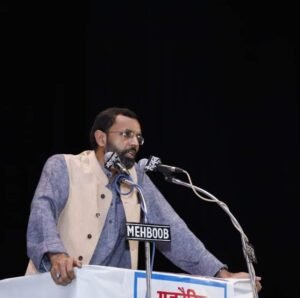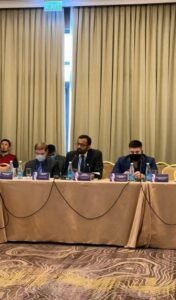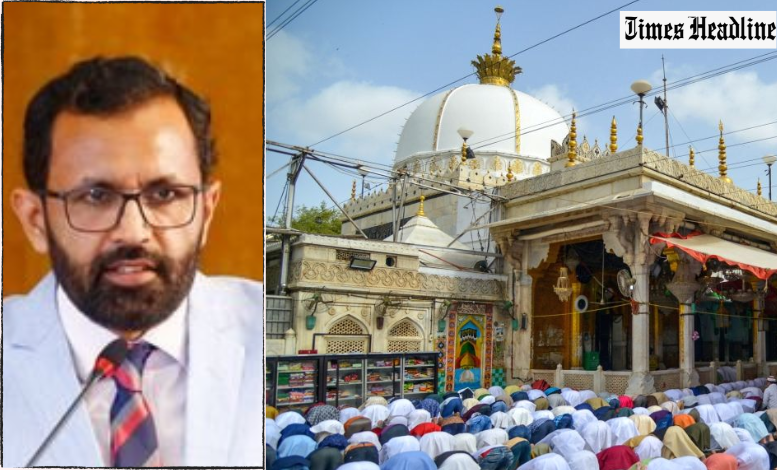Meeting Dr Hafeezur Rahman was an enlightening experience, a self-made genius, and a nationalist with the vision of legendary Amir Khusro who has travelled widely across India and the globe to nations such as Turkey, Iran, Iraq, France, Central Asia and other nations. He is an eloquent speaker, Islamic scholar and author, former faculty of JNU and Convenor of Khusro Foundation whose speeches break many clichés and mundane mindsets and may even shock many of us, as a wake-up call.

Q: I feel very privileged that I could conduct this interview with you, Sir. Please can you tell me about your early life, on how you embarked on your journey for change?
A: I was born in a village in the district of Rampur UP. I remember my early days were happy, but tough too without proper roads and electricity. My father was a farmer and had enough farming land to fulfil the needs of our family, and our house was always open to all with plenty of guests streaming in. I went to a local madrasah and had to study at night in lantern light. Our village was surrounded by two rivers on both sides. After basic school in the village, I went to a higher madrasah in Rampur city and after four years went to one of the leading Sunni Islamic seminaries of North India, Jamia Ashrafia Muabarakpur in the district of Azamgar in UP. One of my bright moments there was a little rhyme in UP English Reader Part 2 that went, “Dear Child, when you go up a hill, never look upon your back.” This rhyme pushed me to go forward and I started to aim for change.
Q: A very energizing rhyme; may I ask you what pushed you forward in life?
A: Well, I was very determined not to let setbacks get me down, I was also a bit of a dreamer and poet and all this mixed with a steely grit got me going. I just studied hard and kept learning. Eventually, I won the reputation of being a “prolific orator” since my teenage days as I was the first graduate in my village of a big region to achieve the first doctorate of philosophy (PhD) which caused quite a stir in those times. I am saying this not to praise myself but to point out that hard work along with some glitter of talent put together in the right places work together.
Q: Your achievements are very remarkable indeed, I can assess you are self-made.
A: Yes, in fact, I am still a learner of new things and a struggler, not an achiever. I find fulfilment in the love and respect bestowed upon me by my audience earned through my knowledge and certificates. After receiving an Alimiyat Certificate from the UP Madarsa Examination Board, I travelled to Delhi for further education at the University, which was my heart’s desire and I did not want to be limited by the traditional madrasa education. I joined Jamia Millia Islamia for an undergraduate course. After completing my graduation, I moved on to my dream destination – the most prestigious university in India, Jawaharlal Nehru University, JNU where I earned my master’s doctorate and got accolades for being one of the best orators in my JNU days. My peak years as a student were in 2004, 2005 and 2006 and I was mostly an independent voice in JNU, a participant in the most elite presidential debate in JNU for three consecutive years. I never endorsed communism and communalism and was more rational and optimistic without being aggressive towards any extent line because a moderate path is always the right path. The mainstream media like the Times of India, Indian Express, The Pioneer and Asian Age published exclusive stories on me. I received the rare among the rarest opportunities to participate in a global UNSECO international conference.
Q: Many Muslims say Islam and Muslims are in danger in India, do you think this is true?
A: No, no, that is not true. I recently wrote an article and I reiterate the same stance that as an Indian Muslim, I have never been afraid because when one is connected to God Almighty, one follows the Constitution and nurtures good relations with the people around them, there is nothing to fear. Some politicians work on sabotaging the emotions of simple Muslims to make them believe that Muslims are in danger. I have been watching politics very closely in India over the last thirty years and understand these games. I believe that India is the best place to live and it gives more freedom to every religion, culture, tradition and community to flourish and practice their path freely which is merely possible in other democratic and even Muslim countries as well.
Q: So, do you feel that some Muslims are playing the victimhood card?
A: Yes, I believe they are, because the Constitution is equal for all, there is no separate Constitution for Muslims and provides equal opportunities for all. We are not beggars but stakeholders and we should think about how we can contribute to nation-building rather than keep asking and complaining. There is a beautiful Urdu couplet by Uday Pratap Singh where he says: “Na tera hai, na mera hai, ye Hindustan subka hai, nahi samjhi gayi ye baat to nuqsan subka hai.”
In my view, Muslims are not a minority but the second-largest community in India and the third-largest in the world. Muslims should be inspired by the micro-small minority communities in India such as the Parsis shining in India with Ratan Tata as a brilliant example, the small community of industrious Jains rule in business, and the diligent Sikhs who suffered the horrific massacre of 1984 rose out of it to rebuild their lives without complaining, famous for their charity, wealth and large-heartedness, the Christians who also suffered clashes and setbacks are the kings of the education system in India, opening the best schools all over the country for all people. I feel sad that most Muslims have forgotten the vision of Sir Syed Ahmad Khan or they too would have launched high-calibre schools, strong education layouts, and great medical and healthcare systems. It is good that the Bohra Muslims and Shia Muslims make a rich contribution to India with their finesse, great contributions and fine education.

Q: Yet, on the whole, with these great achievements, Muslims generally feel neglected. To what degree are the government and politicians responsible for the poor development of the Muslim community?
A: I believe that Muslims have limited themselves to the benefits of what the country has to offer them. The welfare schemes of the government are for all the people equally such as the pension scheme, old people’s scheme, skill development, Awas Yojana, health schemes, education schemes, equal opportunities for Muslims to be in politics, doctors, lawyers, the Army, Navy, Air Force, police, teachers, professors and all other avenues, we have limited ourselves to minority-centric schemes always grumbling about that the government closed for us, with our obsessions about the Waqf Board, Hajj Community, Urdu, Madrasah board, AMU Minority status, Muslim personal law and minority affairs ministry, while all other schemes of welfare never excluded Muslims. Urdu is an Indian language, not a Muslim language so Urdu needs to be restored for our Indian composite culture. Muslims are responsible for creating a separate identity, which political parties use to their advantage by emotionally black-mailing the Muslim community.
Q: Can you share something about the present-day Muslims’ contribution to India?
A: There are many. even countless individuals and organizations that are doing great jobs in different fields by following the vision of Sir Sayyed Ahmad Khan, Maulana Azad, Dr Zakir Hussain and Dr APJ Abdul Kalam at present Mr Mahbubul Hoque who is India’s Sir Syed of the North East, Khushboo Mirza, the Muslim woman scientist who played a role in the Chandrayaan-3 project, Shehnaz Hussain, a business tycoon founder, Sania Mirza, an iconic female tennis player, Shah Rukh Khan in Bollywood, Mohammed Shami’s outstanding cricket performance and the names are endless. Kerala is the finest example where Grand Mufti built the Markaz Knowledge City in Calicut, Sayed Hyder Ali Shihab Thangal built a chain of institutions in Kerala and strengthened people in entrepreneurship, Yusuf Ali is the owner of Lulu company, Mohammad Ali, a stakeholder of Gulfar and Mfar Constructions Private Limited is one of the largest and most reputed companies in the Middle East, Anjuman Islam College in Mumbai founded by Badruddin Tyabji, in Mumbai, Ghulam Mohammad Vastanvi was instrumental in reforming madrasah education, the great Khaja Bandanawaz University in Karnataka founded by Syed Shah Khusro Hussain, College of Engineering and Technology built by Dargah Baba Tajuddin, Nagpur, Azam Campus Pune by P.A. Inamdar, Al Barkaat Public school and management institute by Khanqah Barkatia in Aligarh and Maulana Badruddin Ajmal Assam MP is doing great work in education and business and many others.
Q: It is all very inspiring to learn of these great people who enriched our nation, how do you see your role in contributing towards education in the future?
A: It is my dream project to build the very first model of a modern madrasah for girls, particularly for rural areas equipped with the latest amenities, and a comprehensive curriculum to promote Indianness and Indian Islam so they can accomplish anything they aspire.
Q: This is an amazing vision, I noticed you said you want to build a madrasah for girls.
A.Certain Ulema promote the education of boys in madrasas but neglects girls emphasizing that modern education and co-education were impermissible in Islam. This is why I particularly want to build a modern madrasah for girls.
Q: What does Islam say about gender equality and women’s shared inheritance?
A: The Holy Quran often uses the term, “believing men and women” to emphasize the equality of men and women regarding their respective duties, rights, virtues, and merits. Women are highly revered in Islam.
Q: People say that Islam is against family planning, is it true?
A: The Holy Quran has never stopped family planning nor has Prophet Muhammad (peace be upon him) opposed it. Prophet Mohammed encouraged family planning and a famous Hadith called Hadith e Azl is a better example of how to do that. The interpretations by Islamic jurists seem to conclude that though sterilisation is not permitted, family planning utilizing birth-spacing methods is not only allowed but encouraged.
Q: My next question is a big topic, is Islam against democracy?
A: Not at all. In Islam, power is achieved by the consent of the people. Islam is against the monarchy which was already established by Muslim rulers 30 years after the Prophet’s death and the Islamic government was sustained only 30 years after the Prophet. People’s participation and sharing are important in Islam. Thus, democracy is a part of Islam.
Q: What is Ummah fantasy and is it against nationalism?
A: Not at all, the concept of Ummah is not limited to Muslims only as mentioned in the Medina Charter and also followed by the fourth Caliph Imam Ali during his tenure. It includes all human beings and fellow citizens to be regarded as Ummah. Nationalism and following the law of the land are not against Islam. In fact, Prophet Mohammed, peace be upon him, said that love for the land is half of the faith, he also stressed loyalty to the land and safety of the motherland so a true Muslim must be a true nationalist like Amir Khusro, Maulana Azad and Dr APJ Abdul Kalam because it is our double duty – religious and national.
Q: There is a lot of controversy about the word, Jihad, what does Jihad mean in Islam, does it refer to killing non-Muslims?
A: No, not at all. Killing is against Islam. These are all misinterpretations used by extremists to achieve their political goals. Jihad means striving or doing one’s best. Within Islam, there are two basic theological understandings of the word: The “Greater Jihad” is the struggle against the lower self – the struggle to purify one’s heart, do good, avoid evil and make oneself a better person. The nefarious usage of Jihad rose from radical extremist organisations, groups and scholars brought much bloodshed into the world.
Q: With all the battles to eat beef, is it mandatory in Islam to eat cow meat?
A: Well, it is neither obligatory (wajib) nor mandatory (fard) in Quran to consume meat. The Holy Prophet Muhammad exhorted his followers to abstain from eating the cow’s meat.” He is reported to have said in a Hadith, ‘There is value in cow’s milk, a healing quality in its ghee, and a disease in its meat.”
Q: I heard a Maulana say that greeting non-Muslims on their festivals is not permitted. Is this true?
A: For the sake of peace, and to establish diplomatic and peaceful relations, it is permitted. In Islam, we are taught to respect other religions too and maintain harmony. Prophet Muhammad (peace be upon him) drafted a treaty between the Muslims and the non-Muslims as occupants of the city to live in harmony and respect for each party’s beliefs. All parties lived by the treaty; eventually, Medina became a multicultural society together with their interfaith relations. There are many Sufis, poets and scholars who not only greeted non-Muslims on their festival but also celebrated and praised them like Amir Khusro, Shah Niaz, Bedam Shah Warsi, Barkatullah Pemi, Baba Bulle Shah, Muztar Khairabadi, NazeervAkbarabadi and many more.
Q: Do you feel that more people like Amir Khusro, Dara Shikoh, Dr Kalam, Sir Syed Maulana Azad and Ashfaq Ullah Khan are still sustained in the Muslim community?
A: There are many great Muslims as I mentioned earlier, who are doing incredible work in India. My role model is Amir Khusro because he institutionalized and established patriotism and true nationalism, loved Indian culture, loved Indian languages, and was a proud Indian, a gifted musician, singer, great Sufi, poet, astrologer, and astronomer. Amir Khusro rooted in the heart of India never said he came from Central Asia with an Indian mother, he chose to embrace India as his land, saying, “India is the best place in the entire world” and he maintained a balance in the nation.
I believe our focus should not be on politics but on education, health, business and the development and inclusivity of society and that is the way to progress. Since a child, I have never felt any fear because I believe in my Constitution and I love my country and fellow citizens irrespective of faith caste creed and colour that is the beauty of our country.
Q: Thank you so much, Sir for giving me time for this very enlightening interview which has broken many traditional clichés and myths and has been a great eye-opener!
A: Thank you.
Rita Farhat Mukand is a writer and a freelance journalist.


Congratulations for conducting an interview with him and clearing all those so called tabboos created by the extremist ,and enlighted those perception which portrait true message of Islam .great job